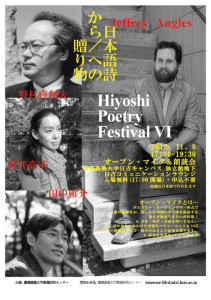August 13, 2012
Here’s Bob Dylan’s classic 1964
“A Hard Rain’s Gonna Fall”,
and the lyrics–
“A Hard Rain’s a – Gonna Fall”
“Oh, where have you been, my blue-eyed son?
And where have you been my darling young one?”
“I’ve stumbled on the side of twelve misty mountains
I’ve walked and I’ve crawled on six crooked highways
I’ve stepped in the middle of seven sad forests
I’ve been out in front of a dozen dead oceans”
“I’ve been ten thousand miles in the mouth of a graveyard
And it’s a hard, it’s a hard, it’s a hard, it’s a hard
It’s a hard rain a-gonna fall”
“Oh, what did you see, my blue eyed son?
And what did you see, my darling young one?”
“I saw a newborn baby with wild wolves all around it
I saw a highway of diamonds with nobody on it
I saw a black branch with blood that kept drippin’
I saw a room full of men with their hammers a-bleedin’”
“I saw a white ladder all covered with water
I saw ten thousand talkers whose tongues were all broken
I saw guns and sharp swords in the hands of young children
And it’s a hard, it’s a hard, it’s a hard, and it’s a hard It’s a hard rain a-gonna fall”
“And what did you hear, my blue-eyed son?
And what did you hear, my darling young one?”
“I heard the sound of a thunder, it roared out a warnin’
I heard the roar of a wave that could drown the whole world
I heard one hundred drummers whose hands were a-blazin’
I heard ten thousand whisperin’ and nobody listenin’”
“I heard one person starve, I heard many people laughin’
Heard the song of a poet who died in the gutter
I heard the sound of a clown who cried in the alley
And it’s a hard, it’s a hard, it’s a hard, it’s a hard
It’s a hard rain’s a-gonna fall”
“Oh, what did you meet my blue-eyed son?
And who did you meet, my darling young one?”
“I met a young child beside a dead pony
I met a white man who walked a black dog
I met a young woman whose body was burning
I met a young girl, she gave me a rainbow”
“I met one man who was wounded in love
I met another man who was wounded in hatred
And it’s a hard, it’s a hard, it’s a hard, it’s a hard
It’s a hard rain’s a-gonna fall”
“And what’ll you do now, my blue-eyed son?
And what’ll you do now, my darling young one?”
“I’m a-goin’ back out ‘fore the rain starts a-fallin’
I’ll walk to the depths of the deepest dark forest
Where the people are many and their hands are all empty
Where the pellets of poison are flooding their waters”
“Where the home in the valley meets the damp dirty prison
And the executioner’s face is always well hidden
Where hunger is ugly, where the souls are forgotten
Where black is the color, where none is the number”
“And I’ll tell it and think it and speak it and breathe it
And reflect from the mountain so all souls can see it
And I’ll stand on the ocean until I start sinkin’
But I’ll know my song well before I start singin’
And it’s a hard, it’s a hard, it’s a hard, and it’s a hard
It’s a hard rain’s a-gonna fall”
And here’s
Kenji Miyazawa‘s classic 1933 “Be Not Defeated By the Rain”
(
Ame ni mo Makezu), (a poem “found posthumously in a small
black notebook in one of the poet’s trunks”), with the lyrics in the
original Katakana and English–
雨ニモマケズ
風ニモマケズ
雪ニモ夏ノ暑サニモマケヌ
丈夫ナカラダヲモチ
慾ハナク
決シテ瞋ラズ
イツモシヅカニワラッテヰル
一日ニ玄米四合ト
味噌ト少シノ野菜ヲタベ
アラユルコトヲ
ジブンヲカンジョウニ入レズニ
ヨクミキキシワカリ
ソシテワスレズ
野原ノ松ノ林ノ蔭ノ
小サナ萓ブキノ小屋ニヰテ
東ニ病気ノコドモアレバ
行ッテ看病シテヤリ
西ニツカレタ母アレバ
行ッテソノ稲ノ朿ヲ負ヒ
南ニ死ニサウナ人アレバ
行ッテコハガラナクテモイヽトイヒ
北ニケンクヮヤソショウガアレバ
ツマラナイカラヤメロトイヒ
ヒドリノトキハナミダヲナガシ
サムサノナツハオロオロアルキ
ミンナニデクノボートヨバレ
ホメラレモセズ
クニモサレズ
サウイフモノニ
ワタシハナリタイ
(English translation, from Wikipedia)
not losing to the rain
not losing to the wind
not losing to the snow nor to summer’s heat
with a strong body
unfettered by desire
never losing temper
always quietly smiling
every day four bowls of brown rice
miso and some vegetables to eat
in everything
count yourself last and put others before you
watching and listening, and understanding
and never forgetting
in the shade of the woods of the pines of the fields
being in a little thatched hut
if there is a sick child to the east
going and nursing over them
if there is a tired mother to the west
going and shouldering her sheaf of rice
if there is someone near death to the south
going and saying there’s no need to be afraid
if there is a quarrel or a lawsuit to the north
telling them to leave off with such waste
when there’s drought, shedding tears of sympathy
when the summer’s cold, wandering upset
called a nobody by everyone
without being praised
without being blamed
such a person
I want to become


